Fleurs du Mal Magazine


Or see the index
Peu de noms évoquent autant le mystère, la sensualité et l’intrigue que celui de Mata Hari. Son histoire est vraie, mais elle comporte tous les ingrédients d’un grand film d’aventure : ambition, argent, sexe, pouvoir et mort tragique…
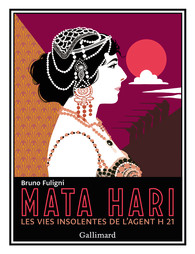 Mère de famille, danseuse nue, espionne et femme fatale, Mata Hari a traversé plusieurs vies avant d’accéder au rang de personnage légendaire. Fusillée en 1917, elle a continué de vivre dans l’imaginaire collectif, devenant un mythe dont se sont emparés le cinéma et la publicité.
Mère de famille, danseuse nue, espionne et femme fatale, Mata Hari a traversé plusieurs vies avant d’accéder au rang de personnage légendaire. Fusillée en 1917, elle a continué de vivre dans l’imaginaire collectif, devenant un mythe dont se sont emparés le cinéma et la publicité.
Première star mondiale, dont le nom sonne comme une marque, elle a inventé le strip-tease, créé un style vestimentaire et inauguré l’ère du renseignement technologique, puisque ce sont les interceptions de la tour Eiffel qui ont Iivré les secrets de l’«agent H 21». Une histoire folle d’une grande modernité.
À partir des archives de la Défense et d’une abondante documentation, Bruno Fuligni révèle la captivante histoire d’une vie faite d’amour, de mensonges et de subterfuges, la vie d’une femme dont le nom est devenu le symbole de l’espionnage au féminin.
Bruno Fuligni
Mata Hari. Les vies insolentes de l’agent H 21
Albums hors série, Gallimard Loisirs
Parution : 12-10-2017
192 pages, ill.,
sous couverture illustrée,
195 x 255 mm, cartonné
Genre : Albums illustrés Thème : histoire
Sous-thème : Temps présent (1914 – XXe s.)
ISBN : 9782742448012
Gencode : 9782742448012
Prix €35,00
new books
fleursdumal.nl magazine
More in: - Book News, - Book Stories, Archive E-F, Art & Literature News, CRIME & PUNISHMENT, FDM in Paris, Mata Hari, WAR & PEACE
Now in paperback, this National Book Award-winning debut poetry collection is a meditation on the black female figure through time.
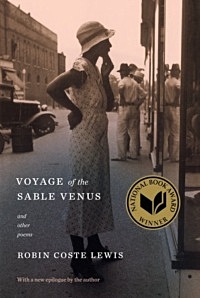 Robin Coste Lewis’s electrifying collection is a triptych that begins and ends with lyric poems meditating on the roles desire and race play in the construction of the self.
Robin Coste Lewis’s electrifying collection is a triptych that begins and ends with lyric poems meditating on the roles desire and race play in the construction of the self.
In the center of the collection is the title poem, “Voyage of the Sable Venus,” an amazing narrative made up entirely of titles of artworks from ancient times to the present–titles that feature or in some way comment on the black female figure in Western art.
Bracketed by Lewis’s own autobiographical poems, “Voyage” is a tender and shocking meditation on the fragmentary mysteries of stereotype, juxtaposing our names for things with what we actually see and know. A new understanding of biography and the self, this collection questions just where, historically, do ideas about the black female figure truly begin–five hundred years ago, five thousand, or even longer? And what role did art play in this ancient, often heinous story?
Here we meet a poet who adores her culture and the beauty to be found within it. Yet she is also a cultural critic alert to the nuances of race and desire–how they define us all, including her own sometimes painful history.
Lewis’s book is a thrilling aesthetic anthem to the complexity of race–a full embrace of its pleasure and horror, in equal parts.
Robin Coste Lewis, the winner of the National Book Award for Voyage of the Sable Venus, is the poet laureate of Los Angeles. She is writer-in-residence at the University of Southern California, as well as a Cave Canem fellow and a fellow of the Los Angeles Institute for the Humanities. She received her BA from Hampshire College, her MFA in poetry from New York University, an MTS in Sanskrit and comparative religious literature from the Divinity School at Harvard University, and a PhD in poetry and visual studies from the University of Southern California. Lewis was born in Compton, California; her family is from New Orleans.
Voyage of the Sable Venus
and Other Poems
By Robin Coste Lewis
Paperback
$19.95
Published by Knopf
Nov. 2017
176 Page
ISBN 9781101911204
new books
fleursdumal.nl magazine
More in: - Book News, - Book Stories, Archive K-L, Archive K-L, Art & Literature News
An exploration of the world’s most famous and challenging song cycle, Schubert’s Winter Journey (Winterreise), by a leading interpreter of the work, who teases out the themes—literary, historical, psychological—that weave through the twenty-four songs that make up this legendary masterpiece.
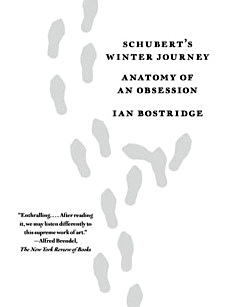 Completed in the last months of the young Schubert’s life, Winterreise has come to be considered the single greatest piece of music in the history of Lieder. Deceptively laconic—these twenty-four short poems set to music for voice and piano are performed uninterrupted in little more than an hour—it nonetheless has an emotional depth and power that no music of its kind has ever equaled.
Completed in the last months of the young Schubert’s life, Winterreise has come to be considered the single greatest piece of music in the history of Lieder. Deceptively laconic—these twenty-four short poems set to music for voice and piano are performed uninterrupted in little more than an hour—it nonetheless has an emotional depth and power that no music of its kind has ever equaled.
A young man, rejected by his beloved, leaves the house where he has been living and walks out into snow and darkness. As he wanders away from the village and into the empty countryside, he experiences a cascade of emotions—loss, grief, anger, and acute loneliness, shot through with only fleeting moments of hope—until the landscape he inhabits becomes one of alienation and despair.
Originally intended to be sung to an intimate gathering, performances of Winterreise now pack the greatest concert halls around the world.
Drawing equally on his vast experience performing this work (he has sung it more than one hundred times), on his musical knowledge, and on his training as a scholar, Bostridge teases out the enigmas and subtle meanings of each of the twenty-four lyrics to explore for us the world
Schubert inhabited, his biography and psychological makeup, the historical and political pressures within which he became one of the world’s greatest composers, and the continuing resonances and affinities that our ears still detect today, making Schubert’s wanderer our mirror.
Ian Bostridge performs regularly throughout Europe, North America and the Far East to outstanding critical acclaim. He read Modern History at Oxford and received a D.Phil in 1990. He is the author of Witchcraft and Its Transformations c.1650-c.1750 and A Singer’s Notebook. He is Humanitas Professor of Music at the University of Oxford and a regular contributor to The Guardian and the TLS. He is married to the writer and critic Lucasta Miller. They live in London with their two children.
Schubert’s Winter Journey
Anatomy of an Obsession
By Ian Bostridge
Paperback
Published on Jan 02, 2018
Published by Vintage
528 Pages
$22.00
ISBN 9780525431800
new books
fleursdumal.nl magazine
More in: # Music Archive, - Book Lovers, - Book News, 4SEASONS#Winter, Archive A-B, Art & Literature News
Le Quartier est une petite ville de banlieue où se croisent les destins de quatre femmes. Mariette, recluse dans son appartement, qui ressasse sa vie gâchée en buvant du vin rouge.
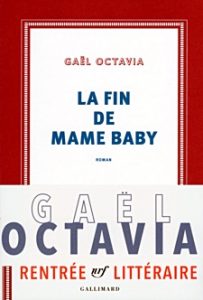 Aline, l’infirmière à domicile, qui la soigne et l’écoute. Suzanne, la petite Blanche, amante éplorée d’un caïd assassiné. Mame Baby, idole des femmes du Quartier, dont la mort est auréolée de mystère.
Aline, l’infirmière à domicile, qui la soigne et l’écoute. Suzanne, la petite Blanche, amante éplorée d’un caïd assassiné. Mame Baby, idole des femmes du Quartier, dont la mort est auréolée de mystère.
À travers la voix d’Aline, de retour dans le Quartier qu’elle a fui sept ans auparavant, les liens secrets qui unissent les quatre héroïnes se dessinent…
La fin de Mame Baby raconte avant tout, avec finesse, grâce et passion, l’art qu’ont les femmes de prendre soin les unes des autres, de se haïr et de s’aimer.
Gaël Octavia
La fin de Mame Baby
Collection Continents Noirs, Gallimard
Parution : 31-08-2017
176 pages
140 x 205 mm
Genre : Romans
Pays : Martinique
Époque : XXIe siècle
ISBN : 9782072737015
Gencode : 9782072737015
Prix € 16,00
new books
fleursdumal.nl magazine
More in: - Book News, Archive O-P, Art & Literature News
A moving collection of autobiographical essays from a Russian poet and refugee of the Bolshevik Revolution.
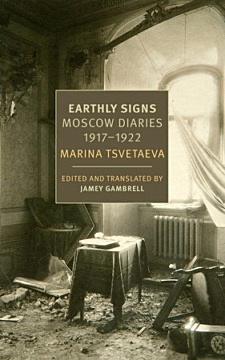 Marina Tsvetaeva ranks with Anna Akhmatova, Osip Mandelstam, and Boris Pasternak as one of Russia’s greatest twentieth-century poets. Her suicide at the age of forty-eight was the tragic culmination of a life buffeted by political upheaval.
Marina Tsvetaeva ranks with Anna Akhmatova, Osip Mandelstam, and Boris Pasternak as one of Russia’s greatest twentieth-century poets. Her suicide at the age of forty-eight was the tragic culmination of a life buffeted by political upheaval.
The essays collected in this volume are based on diaries she kept during the turbulent years of the Revolution and Civil War.
In them she records conversations of women in the markets, soldiers and peasants on the train traveling from the Crimea to Moscow in October 1917, fighting in the streets of Moscow, a frantic scramble with co-workers to dig frozen potatoes out of a cellar, and poetry readings organized by a newly minted Soviet bohemia.
Alone in Moscow with two small children, no income, and a missing husband, Tsvetaeva struggled to feed her daughters (one of whom died of malnutrition in an orphanage), find employment in the Soviet bureaucracy, and keep writing poetry. Her keen and ruthless eye observes with compassion and humor—bringing the social, economic, and cultural chaos of the period to life. These autobiographical writings not only give a vivid eyewitness account of Russian history but provide vital insights into the workings of Tsvetaeva’s unique poetics.
Includes black and white photographs.
Earthly Signs
Moscow Diaries, 1917-1922
By Marina Tsvetaeva
Translated by Jamey Gambrell
Poetry
Paperback
Dec 05, 2017
288 Pages
Paperback
$17.95
Published by NYRB Classics
ISBN 9781681371627
new books
fleursdumal.nl magazine
More in: - Book News, Achmatova, Anna, Archive S-T, Archive S-T, Art & Literature News, Mandelstam, Osip, Pasternak, Boris, REPRESSION OF WRITERS, JOURNALISTS & ARTISTS, Tsvetaeva, Marina
Bullets into Bells is a powerful call to end American gun violence from celebrated poets and those most impacted
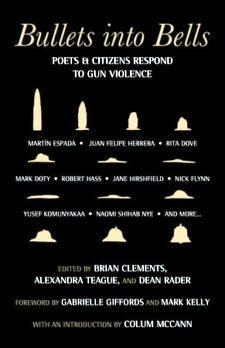 Focused intensively on the crisis of gun violence in America, this volume brings together poems by dozens of our best-known poets, including Billy Collins, Patricia Smith, Natalie Diaz, Ocean Vuong, Danez Smith, Brenda Hillman, Natasha Threthewey, Robert Hass, Naomi Shihab Nye, Juan Felipe Herrera, Mark Doty, Rita Dove, and Yusef Komunyakaa.
Focused intensively on the crisis of gun violence in America, this volume brings together poems by dozens of our best-known poets, including Billy Collins, Patricia Smith, Natalie Diaz, Ocean Vuong, Danez Smith, Brenda Hillman, Natasha Threthewey, Robert Hass, Naomi Shihab Nye, Juan Felipe Herrera, Mark Doty, Rita Dove, and Yusef Komunyakaa.
Each poem is followed by a response from a gun violence prevention activist, political figure, survivor, or concerned individual, including Nobel Peace Prize laureate Jody Williams; Senator Christopher Murphy; Moms Demand Action founder Shannon Watts; survivors of the Columbine, Sandy Hook, Charleston Emmanuel AME, and Virginia Tech shootings; and Samaria Rice, mother of Tamir, and Lucy McBath, mother of Jordan Davis.
The result is a stunning collection of poems and prose that speaks directly to the heart and a persuasive and moving testament to the urgent need for gun control.
Bullets into Bells
Poets & Citizens Respond to Gun Violence
Foreword by Gabrielle Giffords
Introduction by Colum McCann
Edited by Brian Clements, Alexandra Teague and Dean Rader
Category: Poetry
Paperback
Dec 05, 2017
208 Pages
$15.00
Published by Beacon Press
ISBN 9780807025581
new books
fleursdumal.nl magazine
More in: - Book News, - Book Stories, Art & Literature News, CRIME & PUNISHMENT, MUSEUM OF PUBLIC PROTEST, Ocean Vuong, POETRY ARCHIVE
Wüsste man nichts von Jan Wagners lyrischem Werk, man würde überhaupt nur noch Essays von ihm lesen wollen.
 Ob er über Bibliotheken, Buchhandlungen, Lyrik oder Kunst schreibt, ob er literarische Postkarten aus Rom oder Los Angeles sendet oder die Epiphanie eines Rosmarins im schwäbischen Garten feiert – man glaubt diesem charmanten Geschichtenerzähler alles.
Ob er über Bibliotheken, Buchhandlungen, Lyrik oder Kunst schreibt, ob er literarische Postkarten aus Rom oder Los Angeles sendet oder die Epiphanie eines Rosmarins im schwäbischen Garten feiert – man glaubt diesem charmanten Geschichtenerzähler alles.
Es bleibt kaum Zeit, die rhetorische Fingerfertigkeit zu bewundern, mit der da zwischen souveräner Gelehrsamkeit unerwartet die nächste Anekdote aus dem Ärmel gezogen wird, und man kann nicht anders als staunen über die Trouvaillen, die Jan Wagner von seinen Entdeckungsreisen quer durch Epochen und Kontinente mitbringt.
Jan Wagner, 1971 in Hamburg geboren, lebt in Berlin. 2001 erschien sein erster Gedichtband Probebohrung im Himmel. Es folgten Guerickes Sperling (2004), Achtzehn Pasteten (2007), Australien (2010), Die Eulenhasser in den Hallenhäusern (2012) und zuletzt der Sammelband Selbstporträt mit Bienenschwarm (2016). Zudem ist er Mitherausgeber der Minnesang-Anthologie Unmögliche Liebe (Die Kunst des Minnesangs in neuen Übertragungen, 2017). Für seine Lyrik wurde Jan Wagner vielfach ausgezeichnet. Mit seinem Gedichtband Regentonnenvariationen (2014) gewann er 2015 den Preis der Leipziger Buchmesse, außerdem wurde er 2017 mit dem Georg-Büchner-Preis ausgezeichnet.
Jan Wagner:
Der verschlossene Raum.
Beiläufige Prosa
EAN: 9783446254756
ISBN: 3446254757
Libri: 2557154
Hanser Berlin
2017 – 268 Seiten
gebunden € 22,00
new books
fleursdumal.nl magazine
More in: - Book News, - Book Stories, Archive W-X, Archive W-X, Art & Literature News
Dès l’origine l’écriture de Fabienne Courtade tend au plus extrême dépouillement, par le biais d’une méditation qui n’oublie jamais le monde extérieur, ni le travail matériel propre à la poésie contemporaine.
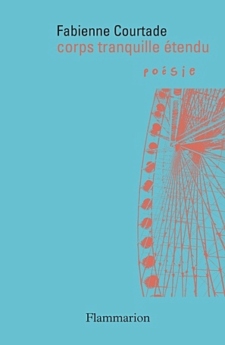 Dans ce nouveau chant contrarié – tourné plutôt vers une impossible lumière – la narration s’est encore resserrée, le lexique et l’anecdote se voient ramenés à l’essentiel. Une femme marche dans la ville et se parle à elle-même ou s’adresse à une ombre, évoquant des instants enfuis, une présence obsédante, des paysages estompés.
Dans ce nouveau chant contrarié – tourné plutôt vers une impossible lumière – la narration s’est encore resserrée, le lexique et l’anecdote se voient ramenés à l’essentiel. Une femme marche dans la ville et se parle à elle-même ou s’adresse à une ombre, évoquant des instants enfuis, une présence obsédante, des paysages estompés.
Aucune nostalgie néanmoins ni mélancolie dans ces pages : il s’agit au contraire de capter dans le déroulement des gestes, des trajets, des décors les plus ordinaires, une grâce moins apparente que le temps décidément n’abolit pas. Et que le poème parvient à fixer avec ses outils de langage, dans l’évidence et le mystère qui lui sont propres.
Depuis Nous, infiniment risqués (1987) Fabienne Courtade est l’auteur d’une quinzaine d’ouvrages, au carrefour du poème et du récit. Corps tranquille étendu est le quatrième titre qu’elle publie dans la collection Poésie/Flammarion.
Fabienne Courtade
‘corps tranquille étendu’
Poésie/Flammarion
Paru le 15/11/2017
Genre : Théâtre
224 pages
Grand format 129 x 199 cm
Broché
EAN : 9782081415508
ISBN : 9782081415508
€ 17.00
new books
fleursdumal.nl magazine
More in: - Book News, - Book Stories, Archive C-D, Archive C-D, Art & Literature News, THEATRE
“The experiences could be understood only as being of such extremity that they stood beyond written words; it was not a failure of language, but a view that, for the individual, language, particularly written words, and the enormity of the experience were not matched.”
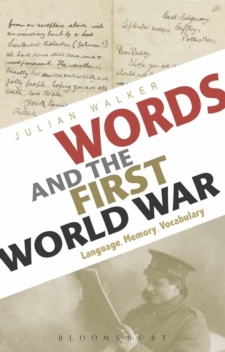 First World War expert Julian Walker looks at how the conflict shaped English and its relationship with other languages. He considers language in relation to mediation and authenticity, as well as the limitations and potential of different kinds of verbal communication.
First World War expert Julian Walker looks at how the conflict shaped English and its relationship with other languages. He considers language in relation to mediation and authenticity, as well as the limitations and potential of different kinds of verbal communication.
Walker also examines:
– How language changed, and why changed language was used in communications
– Language used at the Front and how the ‘language of the war’ was commercially exploited on the Home Front
– The relationship between language, soldiers and class
– The idea of the ‘indescribability’ of the war and the linguistic codes used to convey the experience
‘Languages of the front’ became linguistic souvenirs of the war, abandoned by soldiers but taken up by academics, memoir writers and commentators, leaving an indelible mark on the words we use even today.
Julian Walker is a writer, researcher, artist and educator. He is an Honorary Research Associate at University College, London, UK. He is the co-author of Languages and the First World War: Communicating in a Transnational War (2016), the author of The Roar of the Crowd (2016) and Trench Talk (2012) among many others. His website is www.julianwalker.net
Writes: Lexicology, First World War, Sociolinguistics and Linguistic Anthropology, World History, Heritage
Author of : Words and the First World War, Team Talk, Discovering Words in the Kitchen, Discovering Words
“This is a substantial book, dense but always accessible, covering both time and space. Gratifyingly, it sidesteps an all too common error that entraps books on words, of becoming no more than a padded dictionary.” – The Daily Telegraph
Words and the First World War
Language, Memory, Vocabulary
By: Julian Walker
Published: 28-12-2017
Format: Paperback
Edition: 1st
Extent: 416
ISBN: 9781350001923
Imprint: Bloomsbury Academic
Illustrations: 50 bw images
Dimensions: 216 x 138 mm
Prize: £14.99
fleursdumal.nl magazine
More in: *War Poetry Archive, - Book News, - Book Stories, Archive W-X, Art & Literature News, Histoire de France, Historia Belgica, History of Britain
The letters of the great writer to his wife—gathered here for the first time—chronicle a decades-long love story and document anew the creative energies of an artist who was always at work.
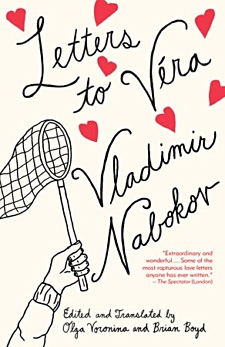 No marriage of a major twentieth-century writer is quite as beguiling as that of Vladimir Nabokov’s to Véra Slonim. She shared his delight in life’s trifles and literature’s treasures, and he rated her as having the best and quickest sense of humor of any woman he had met. From their first encounter in 1923, Vladimir’s letters to Véra form a narrative arc that tells a half-century-long love story, one that is playful, romantic, pithy and memorable. At the same time, the letters tell us much about the man and the writer. We see the infectious fascination with which Vladimir observed everything—animals, people, speech, the landscapes and cityscapes he encountered—and learn of the poems, plays, stories, novels, memoirs, screenplays and translations on which he worked ceaselessly. This delicious volume contains twenty-one photographs, as well as facsimiles of the letters themselves and the puzzles and doodles Vladimir often sent to Véra.
No marriage of a major twentieth-century writer is quite as beguiling as that of Vladimir Nabokov’s to Véra Slonim. She shared his delight in life’s trifles and literature’s treasures, and he rated her as having the best and quickest sense of humor of any woman he had met. From their first encounter in 1923, Vladimir’s letters to Véra form a narrative arc that tells a half-century-long love story, one that is playful, romantic, pithy and memorable. At the same time, the letters tell us much about the man and the writer. We see the infectious fascination with which Vladimir observed everything—animals, people, speech, the landscapes and cityscapes he encountered—and learn of the poems, plays, stories, novels, memoirs, screenplays and translations on which he worked ceaselessly. This delicious volume contains twenty-one photographs, as well as facsimiles of the letters themselves and the puzzles and doodles Vladimir often sent to Véra.
Vladimir Nabokov was born on April 23, 1899, in St. Petersburg, Russia. He wrote in both Russian and English, and his best works, including Lolita (1955), feature stylish, complex literary effects. A collection of Nabokov’s missives to his wife was published as Letters to Véra. Nabokov died in Montreux, Switzerland, in 1977.
Letters to Véra
By Vladimir Nabokov
Part of Vintage International
Category: Arts & Entertainment Biographies & Memoirs – Literary Figure Biographies & Memoirs – Literary Collections
Published Dec 12, 2017
by Vintage
864 Pages
With 8 pages of photographs and 47 illustrations in text
Paperback – $20.00
ISBN 9780307476586
Language: English
fleursdumal.nl magazine
More in: - Book News, - Bookstores, Archive M-N, Art & Literature News, Vladimir Nabokov
Lijvig overzicht van sleutelfiguren uit de hedendaagse kunst, geselecteerd en beschreven door Philippe Van Cauteren en uitgegeven door Uitgeverij Hannibal.
Al jarenlang schrijft Philippe Van Cauteren brieven naar kunstenaars van over de hele wereld.
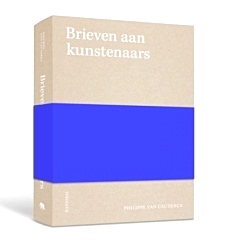 Hij richt zich op een zeer persoonlijke manier tot kunstenaars die hem inspireren en legt hen uit waarom. Vaak zit in de brieven reeds de basis van een nieuwe tentoonstelling vervat.
Hij richt zich op een zeer persoonlijke manier tot kunstenaars die hem inspireren en legt hen uit waarom. Vaak zit in de brieven reeds de basis van een nieuwe tentoonstelling vervat.
Van Cauterens brieven zijn literair, maar tegelijk direct en geschreven in een erg toegankelijke stijl.
Ze geven een bijzondere inkijk in de manier waarop een curator kunst beleeft en interpreteert, en zijn bovendien een zeer duidelijke en beknopte introductie tot het werk van de kunstenaars die hij aanschrijft. Ze zijn steeds een opening tot een dialoog en stemmen tot nadenken over de hedendaagse kunst.
Deze publicatie bundelt meer dan honderd brieven. Elke brief wordt geconfronteerd met een sleutelwerk van de kunstenaar aan wie hij is gericht.
In een inleidend manifest tekent Van Cauteren ook de grote lijnen uit van het ‘ideale museum van de toekomst’. Als directeur van het S.M.A.K. en opvolger van visionair Jan Hoet heeft hij daarover zeer concrete ideeën.
Dit boek reflecteert over het hedendaagse culturele veld en de plaats die het museum en de kunstenaar hierin innemen en hoe de verschillende partijen op een zo constructief mogelijk manier kunnen samenwerken.
Van Cauteren richt zijn pen onder meer tot Michael Borremans, Berlinde De Bruyckere, Jan Fabre, Guillaume Bijl, Jef Geys, Jan Hoet, Ann Veronica Janssens, Mark Manders, Rinus Van de Velde en Vincent van Gogh.
Brieven aan kunstenaars
Philippe Van Cauteren
19 x 13,5 cm
352 bladzijden
Softcover
Quadrichromie
Nederlandstalige editie
ISBN 978 94 9267 730 3
Uitgeverij Hannibal
Prijs: € 29,50
Het boek is ook te koop in S.M.A.K. Gent.
new books
fleursdumal.nl magazine
More in: - Book News, - Book Stories, Archive C-D, Art & Literature News, Art Criticism, Exhibition Archive, FDM Art Gallery
In Brüssel laufen die Fäden zusammen – und ein Schwein durch die Straßen.
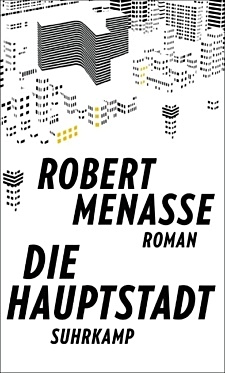 Fenia Xenopoulou, Beamtin in der Generaldirektion Kultur der Europäischen Kommission, steht vor einer schwierigen Aufgabe. Sie soll das Image der Kommission aufpolieren. Aber wie? Sie beauftragt den Referenten Martin Susman, eine Idee zu entwickeln.
Fenia Xenopoulou, Beamtin in der Generaldirektion Kultur der Europäischen Kommission, steht vor einer schwierigen Aufgabe. Sie soll das Image der Kommission aufpolieren. Aber wie? Sie beauftragt den Referenten Martin Susman, eine Idee zu entwickeln.
Die Idee nimmt Gestalt an – die Gestalt eines Gespensts aus der Geschichte, das für Unruhe in den EU-Institutionen sorgt. David de Vriend dämmert in einem Altenheim gegenüber dem Brüsseler Friedhof seinem Tod entgegen. Als Kind ist er von einem Deportationszug gesprungen, der seine Eltern in den Tod führte. Nun soll er bezeugen, was er im Begriff ist zu vergessen.
Auch Kommissar Brunfaut steht vor einer schwierigen Aufgabe. Er muss aus politischen Gründen einen Mordfall auf sich beruhen lassen; »zu den Akten legen« wäre zu viel gesagt, denn die sind unauffindbar.
Und Alois Erhart, Emeritus der Volkswirtschaft, soll in einem Think-Tank der Kommission vor den Denkbeauftragten aller Länder Worte sprechen, die seine letzten sein könnten.
In seinem neuen Roman spannt Robert Menasse einen weiten Bogen zwischen den Zeiten, den Nationen, dem Unausweichlichen und der Ironie des Schicksals, zwischen kleinlicher Bürokratie und großen Gefühlen. Und was macht Brüssel? Es sucht einen Namen – für das Schwein, das durch die Straßen läuft. Und David de Vriend bekommt ein Begräbnis, das stillschweigend zum Begräbnis einer ganzen Epoche wird: der Epoche der Scham.
Robert Menasse wurde 1954 in Wien geboren und ist auch dort aufgewachsen. Er studierte Germanistik, Philosophie sowie Politikwissenschaft in Wien, Salzburg und Messina und promovierte im Jahr 1980 mit einer Arbeit über den »Typus des Außenseiters im Literaturbetrieb«. Menasse lehrte anschließend sechs Jahre – zunächst als Lektor für österreichische Literatur, dann als Gastdozent am Institut für Literaturtheorie – an der Universität São Paulo. Dort hielt er vor allem Lehrveranstaltungen über philosophische und ästhetische Theorien ab, u.a. über: Hegel, Lukács, Benjamin und Adorno. Seit seiner Rückkehr aus Brasilien 1988 lebt Robert Menasse als Literat und kulturkritischer Essayist hauptsächlich in Wien.
Der große europäische Roman
Deutscher Buchpreis 2017
Robert Menasse
Die Hauptstadt
EAN: 9783518427583
ISBN: 351842758X
Libri: 4003586
Suhrkamp Verlag AG
September 2017
459 Seiten
gebunden
€ 24,00
new books
fleursdumal.nl magazine
More in: - Book News, - Book Stories, Archive M-N, Art & Literature News, Awards & Prizes
Thank you for reading Fleurs du Mal - magazine for art & literature